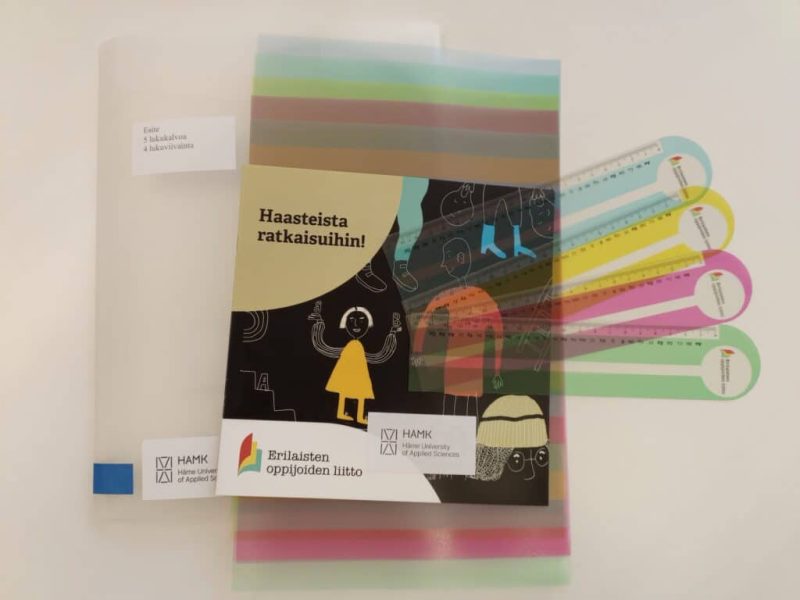“Celia has opened up a whole new world to me”

What kind of service is lavished with praise for its very existence? In this article, HAMK students Janne Honkanen and Satu Jääskeläinen talk about their experiences with Celia audiobooks.
Celia provides audiobooks, when reading is difficult
HAMK students have access to audiobooks through the Accessibility Library Celia. Celia is a special library of the State of Finland, whose statutory task is to promote equality in reading and learning. Students with print disability can listen to audiobooks specifically related to their studies with the help of Celia.
Satu Jääskeläinen has just finished her first year in the social services degree programme. She got her Celia credentials from her local library and has been using Celia to listen to books for a couple of years. Jääskeläinen learned about Celia in a neurodiversity support group from an experience expert. Janne Honkanen joined HAMK last year to continue his mechanical engineering studies started elsewhere. He learned about Celia through student well-being services and got his Celia credentials from HAMK Library in the spring of 2024.
Student wellbeing services have become familiar at the beginning of Jääskeläinen’s studies. A special needs teacher, psychologist and welfare officer have all visited to introduce themselves to the student groups, and the library has also presented its services. Honkanen praises the HAMK digital skills starter kit as being very useful, even though it initially seemed like a laborious and possibly pointless project.
Personal way of studying
Jääskeläinen feels her ADHD has slowed down her reading, so audiobooks have been a big help. “It makes it so much easier to read because reading is really hard and slow for me. I could almost argue that if I had to read the books I listened to, they would have remained unfinished. “
Listening to books allows focusing on the text however the listener likes. Reading speed, listening style, and any additional functions that help with concentration can be adjusted. For example, Jääskeläinen knits while listening. “Knitting at the same time is a way for me to calm down, put your book on headphones and pick up knitting needles,” she laughs. While listening, you can also do cleaning up, which helps with motivation. “And the very fact that you know you can also listen to those books, that in itself motivates you. You don’t have to worry about it. The threshold is much lower,” Jääskeläinen says.
Honkanen, on the other hand, listens to the text while he reads, as it helps focus best: “I have heard that some people do housework, clean or wash dishes while listening. I have two options. Either I don’t know what I’ve been listening to, or I have dirty dishes.”
Reading is influenced by many factors, so different people are helped by different tools and different ways of reading. As Honkanen points out, “the difficulty of reading can be caused by a variety of things, but the end result is just the same: that reading doesn’t go well.”
Other aids are also worth trying
“There’s been a lot of reading online, but I’ve listened to a few books through Celia. Even a computer is good when you use its reading aloud system,” Jääskeläinen states. For example, you can listen to Ellibs e-books with a browser add-on, which Honkanen also uses to listen to websites: “It’s just great because it’s in a browser and works on any website.” Honkanen uses a browser add-on to listen to text in English, and Microsoft Word’s text-to-speech feature for text in Finnish.
Jääskeläinen has borrowed and tested a reading aid package with coloured film sheets from HAMK library but did not find them useful with printed books. For her, the audiobook is number one. Honkanen has taken advantage of MS Word immersive reader and the inverted colours function available in Windows’ accessibility features: due to his eye injury, he finds it easier to read white text on a black background. “When you change the background colour back to white, you immediately notice how much of a strain it becomes,” he says.

Celia is praised for its ease of use
Jääskeläinen uses Celia primarily on her phone with the Pratsam Reader app. She considers both Celianet and Pratsam Reader to be very functional, and it was easy for her to start using Celia independently through the public library. At HAMK Library, Celia credentials are created together with the staff. The student gets to make sure that the credentials work and also learns about Celianet use.
Jääskeläinen’s wish for improvement would be that more textbooks would be available as human voice versions. “The textbooks are pretty much machine sound versions and they can be quite numbing because the machine sound is so even. I still think it’s better than nothing.” Jääskeläinen also thinks it would be nice if there were more options for reading voice, as is often the case for example with browser reading programmes.
Being able to adjust the reading speed is an important feature for Honkanen. He would like the user interface to be even more fluid and for the book to continue where listening was left off the previous time when it is borrowed again.
Textbooks can also be requested from Celia
Celia provides access to both textbooks and fiction. Honkanen is using Celia just for his studies. Jääskeläinen also listens to a lot of fiction, although Celia’s selection has not always included the books she has wished for. Fortunately, Celia accepts requests for textbooks, though it usually takes about three months to produce a machine-voiced version. “Perhaps that process could be faster in some ways. But on the other hand, it will help the next person who needs that book,” Jääskeläinen ponders. Honkanen greatly appreciates the opportunity to request books from Celia, as many are not available even commercially. “It is just brilliant that you can give those requests there.”
Jääskeläinen listens to something on Celianet every day. “Celia has opened up a whole new world to me. I didn’t really read for a long time when it was so hard. This has really been my salvation.”
Celia is worth a try
Jääskeläinen encourages everyone to try Celia. “I’ve heard criticism of that machine voice from others, but you get used to it and you can adjust the reading speed yourself. Not everything is for everyone, but I’ve gotten so much out of this myself. And when you think that it is a free service.”
Honkanen considers it important that different digital accessibility functions become more widely known to people: “I have now come across accessibility for the first time. Before this, its meaning to me was that public spaces have ramps for wheelchairs.” He also hopes that accessibility functions will be advertised to everyone so that the fear of being labelled “stupid” does not prevent their use.
Honkanen’s advice is that if you consider trying Celia services, you don’t need to think, just do it. “It takes more time every day to press the button on the remote than it does to get to know Celia.”
Would you like to have Celianet credentials?
If you have a print disability, you are eligible for Celia services. Celia can also assist you to join the Bookshare service. Contact HAMK library and we will tell you more. Suggest a suitable time for us to meet you online: hamk.kirjasto@hamk.fi
For basics on the ease of e-resource use, see HAMK Finna e-resource help.
Written by Rosa Ovaska